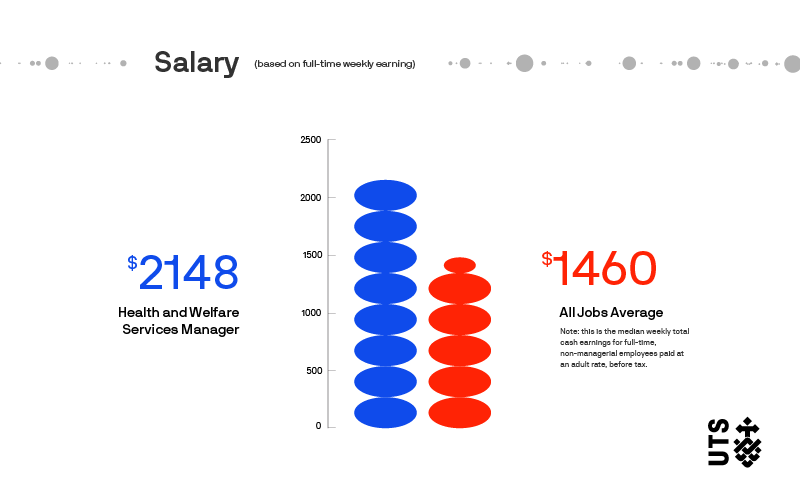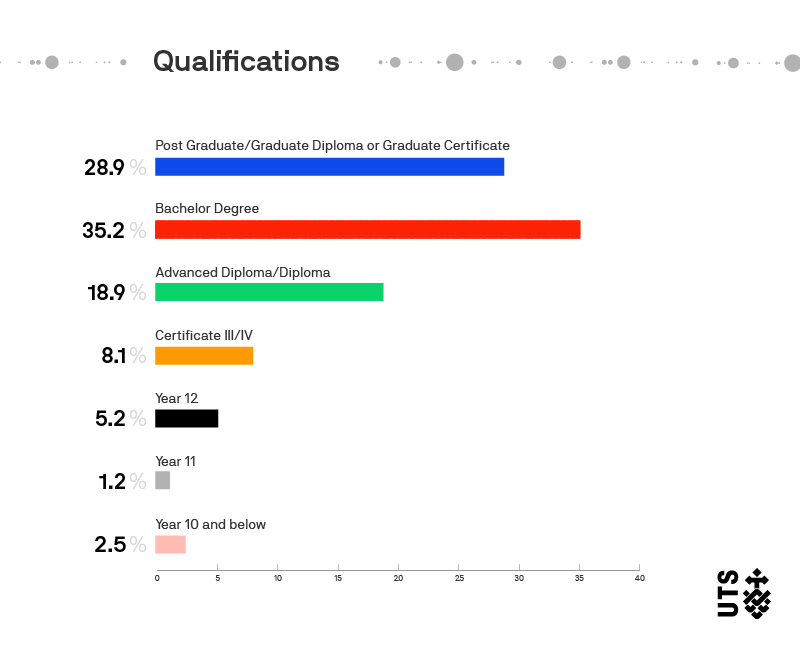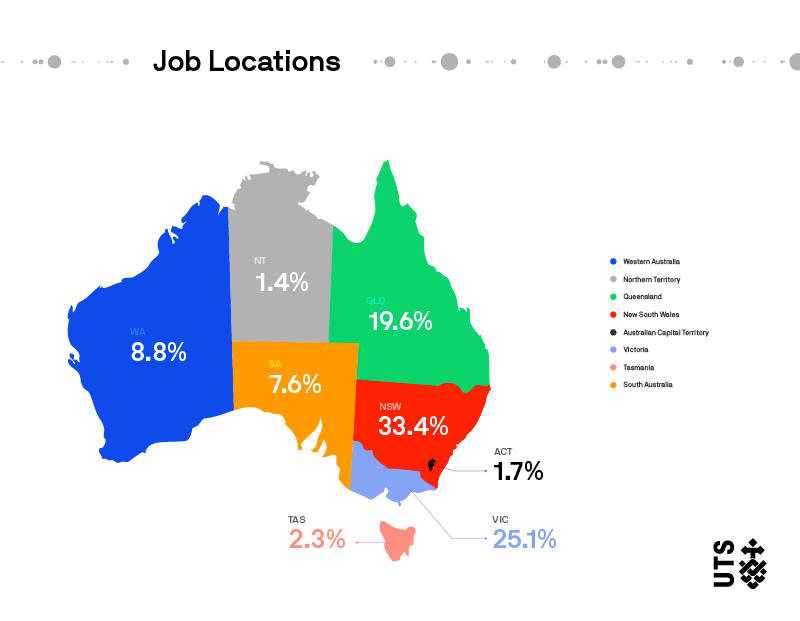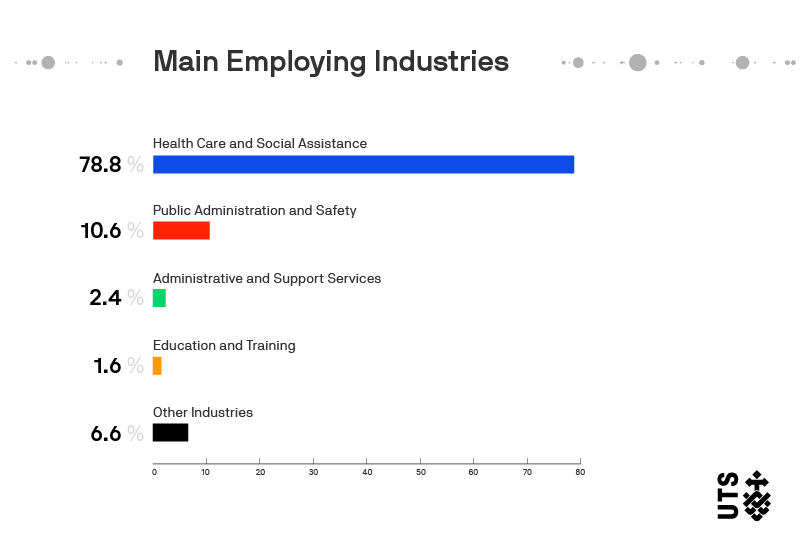The role of the health services manager


As one of Australia’s biggest employers, healthcare services across Australia are crying out for more health professionals.
According to Jobs and Skills Australia, four out of five health occupations in Australia were facing skills shortages in 2023. With the rise of remote working, many families have moved out of cities, meaning regional areas are especially struggling with healthcare recruitment.
With all healthcare professionals projected to have strong or moderate demand in future years, the demand for healthcare workers is likely to increase.
This environment presents both a challenge and an opportunity for health professionals who are planning a move into management or have already found themselves there.
But what is the role of a health services manager? While the core abilities of leadership and problem-solving remain constant, the variables of location, health specialisation and community make health services management a profession of many colours.
While this has always been a challenging role that requires a health professional with advanced qualifications, it’s a role that’s becoming both more demanding and more in demand.
Below, we’ll examine the role of a health services manager, including key skills, insights and what you need to succeed in this role.
What does a health services manager do?
The role of health services managers is to contribute to improving the health of populations and individuals. They also safeguard the quality and safety of patient care, recognise and respond to the needs of vulnerable individuals and populations, and ensure the best use of resources.
To this end, UTS’s online Master of Health Services Management promises to arm you with the skills to navigate the politics, policy and data in health and social care.
Although workplaces vary, the role of a health services manager has similar duties and responsibilities, regardless of whether you work in a hospital or in wider health services. This is also true across state borders, with a study by Liang et al. (2020) finding that “the essential tasks for higher level managers are consistent across health and social care sectors” across Victoria, New South Wales and Queensland.
According to the Australian Bureau of Statistics, those tasks include:
- providing overall direction for the health service
- developing, implementing and monitoring procedures, policies and standards for health and administrative staff
- managing clinical services and health programs
- monitoring and evaluating the effective use of resources
- budgeting and financial management
- collaborating with other health services providers and funding bodies
- advising government bodies
- representing the health service in negotiations and public relations; and
- managing human resources.
This means that with the right qualifications, a health services manager has the potential to apply their expertise and skills to any hospital or health service in any region of Australia.
What are the top skills of a health services manager?
The tasks that are common across all health services manager roles align strongly with Henri Fayol’s theory of management. In a nutshell, the theory posits that organisational efficiency is increased when managers are competent in forecasting, planning, organising, commanding, coordinating and controlling.
However, the ability to carry out these tasks isn’t enough to be successful in health services management. Because health services managers work in challenging environments, they require all the standard competencies of managers, as well as the specialist skills required to manage staff from a variety of disciplines and professional backgrounds.
Additionally, they need to operate in a highly political environment that is regularly under public and media scrutiny, and they need a deep understanding of social, cultural, economic, demographic and technical forces.
So what skills can health services managers cultivate to thrive in this role? Here are four main types of healthcare management skills.
Interpersonal skills
Often referred to as soft skills, interpersonal skills rely on your emotional intelligence to influence others. They include leadership skills, relationship skills and the capacity to help others or delegate tasks to them.
You may use these skills to collaborate with other medical services managers, support your team through challenging times, or maximise volunteers' efforts.
When she was acting manager of Bega Valley Health Services, Vickye Coffey oversaw the annual volunteers’ day at Southern NSW Local Health District. Like many healthcare and welfare services at capacity, volunteers play a vital role here as auxiliary workers, patient support, pastoral care and transport drivers. Coffey was keen to remind them that they are valuable members of the team.
"It's fitting that volunteers be publicly recognised for their dedication, passion and skill. They embody the best qualities in our community, and they're a role model for others," says Coffey.
UTS Online’s Master of Health Services Management offers a major specialisation in Leadership to promote your interpersonal skills.
Analytical skills
Until recently, the computer skills required for health services management probably included proficiency with email, the Microsoft Office Suite and a patient management system. However, the digitisation of the workplace has created a lot of health information in the form of data, which creates its own management challenges.
You will still be expected to use analytical tools and techniques from business disciplines including finance, marketing and operations management. However, you will also be expected to use the tools and techniques of data analysis for planning.
The digitisation of patient data also raises privacy issues, which can be amplified when health information is transferred between incompatible systems. Understanding the risks, consequences and, most importantly, responsible use of patient data is essential.
UTS Online’s Master of Health Services Management offers a major specialisation in Digital Health and Analytics to upgrade your information management skills.
Information management skills
In research conducted by Slipicevic and Masic (2012), information management skills refer to the ability to gather and analyse information. While this may include digital information, it also includes information gathered from professional development, professional literature and even conversations or meetings within your organisation.
You need to be able to assimilate the information that you collect, organise and interpret to be able to put it to use. Then you may need to call on your skills in change management when it comes to implementing those learnings.
UTS Online’s Master of Health Services Management offers a major specialisation in Quality and Safety. It gives you the knowledge to apply planning and evaluation techniques, understand data and data sources, and assess systems for innovation.
Action skills
When you’ve listened and decided on a course of action, you need some key skills to assist a successful outcome – goal setting and entrepreneurial skills.
As Primary Health Services Manager of the Latrobe Community Health Service, Karen Pettifer put both skills to work. With only one testing site that also required a doctor’s referral, Pettifer heard the community calls for more testing facilities. Under a tight timeframe, she worked with the government, retailers and other health services to help her health services team make a difference.
"There is a lot of work that goes on behind the scenes to make sure we've got a safe testing site for the community," says Pettifer.
"There has been a really positive approach between Latrobe City, Latrobe Regional Hospital, Kmart and lots of staff at Latrobe Community Health Services as well."
With UTS Online’s Master of Health Services Management, you can study subjects in Implementing and Evaluating Change, Planning for Health and Social Services and other key subjects to help you set goals and coordinate outcomes.
Healthcare management: key insights
Higher skills and responsibility can mean higher salaries. According to Seek, health services managers can expect to earn an average salary of $105,000-$125,000 per year.

Taking the step up to health services management is something that can be achieved through experience and on-the-job training. However, almost a third of health services managers across Australia already have a postgraduate qualification.

Health services management roles are available in hospitals and specialist health services across Australia. The majority of jobs are on the east coast, with Queensland, New South Wales and Victoria accounting for almost 80 per cent of all employment.

In terms of industry, almost 80 per cent of health services managers are working in organisations that provide healthcare and social assistance. Another 10 per cent are focussing on public administration and safety. As a management role, the transferable skills of health services managers can also be found in administrative and training organisations as well as a variety of other industries.

Date source: Job Outlook
How do I become, or develop as, a health services manager in Australia?
If the health services managers we’ve looked at in this article are anything to go by, the path to becoming and developing as, a health services manager is not necessarily a straight line. But, as the key insights demonstrate, a postgraduate qualification will put you in the company of a third of all health services managers.
UTS Online’s Master of Health Services Management is a course that you can complete 100 per cent online. So, you can continue working and study at times and locations that are convenient to you. That means you can apply your new skills immediately and focus your efforts on getting the right work experience to achieve your goal.
Our master’s degree offers six in-demand majors, including:
- Quality and Safety
- Leadership
- Digital Health and Analytics
- Business Administration
- Decision-Making for Health Leaders
- Flexible - one subject plus five electives of your choice from a specialised list.
If you are looking for a shorter upskill, you might also consider UTS Online’s Graduate Certificate in Health Services Management, a foundational course that covers four units and can serve as a pathway to the master’s degree.
Built by health professionals for health professionals, this program gives you the opportunity to tailor your career interest with specialisations in Quality and Safety, Digital Health, and Leadership or Planning.
With a variety of roles that are as unique as the people who perform them, this qualification will help you find your perfect health services management match.
To learn more about the online Master of Health Services Management, get in touch with our Enrolment Advisors on 1300 477 423 or at enquire@studyonline.uts.edu.au





